Epicurus was born into a poor family. His parents; Neocles and Chaerestrate were from Athens but lived in Samos. He was just an ordinary person and got along with the Garden community he had formed. At the age of ten, Epicurus studied philosophy from Pamphilus (a student of Plato). He also studied philosophy from Nausiphanes (a student of Democritus) to build the idea of Atomism in the style of democracy as the basic foundation of his philosophy.
Epicurus (-341 to -270)
BackFounder of the School of Epicureanism
Epicurus lived around was a Hellenistic philosopher and founder of the School of Epicureanism. In the Greek-speaking region, the Hellenistic era was a period of Macedonian rule characterized by conquest and chaos - remnants wiped out by the Roman annexation of Egypt after Cleopatra's death.
The circumstances at that time made Hellenistic philosophers unique from previous philosophers. If it was a pre-Socratic philosopher; Thales, Anaximander, etc. busy answering nature and the Socrates-Plato-Aristotle trio trying to build a complete philosophical system, the Hellenistic philosophers explained more about ethics, virtues, and how to live life today.
Epicurus as the founder of the School of Epicureanism stated that philosophy is an activity that contains arguments and discussions that lead to a happy life. As a Hellenistic philosopher, Epicurus inherited a peculiar Hellenistic character that emphasized a philosophy for how to live without suffering. For the history of Old Greece in fact Epicurus was a great figur in their timeline of human history.
Left Athena & learning philosophy (-321)
 The division of Macedonian territory was based on the Partition of Babylon after the death of Alexander the Great in 323 BC
The division of Macedonian territory was based on the Partition of Babylon after the death of Alexander the Great in 323 BC
After Alexander's death (323 BC), when the Athenians were driven from Samos, Epicurus left Athens and joined his father at Colophon (321 BC), on the coast of what is now Turkey. Here Epicurus, studying philosophy under the supervision of Nausiphanes, a Democratic philosopher with skeptical tendencies, and the author of a work called Tripod.
Establishing schools (-311)
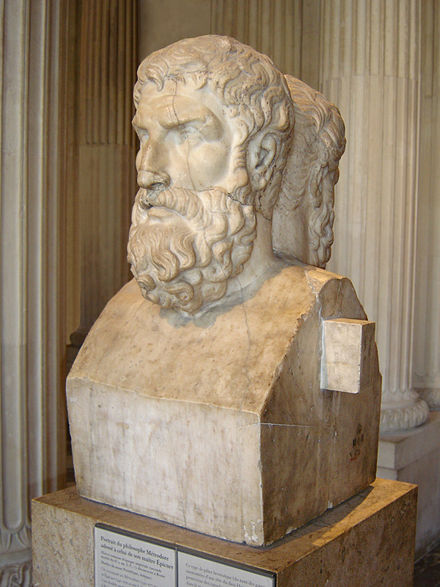 Epicurus head sculpture that rests on a statue of the head of his disciple, Metrodoros, at the Louvre Museum
Epicurus head sculpture that rests on a statue of the head of his disciple, Metrodoros, at the Louvre Museum
In 311 BC, Epicurus founded his first school in Mytilene, then moved to Lampsacus. In 306 BC he returned to Athens and founded the school The Garden. As the name implies, this school takes place in a garden in the area of Epicurus' house. The Garden disciples not only heard Epicurus' teachings but were also a community that stuck to their teacher's teachings.
Contributions on philosophy (-300)
For Epicurus, pleasure is something of high value in humans. He presented his opinion in three letters and one work containing his oral teachings. A total of no more than 100 pages, as contained in the Letter to Menoichaeus, was written in about 300 BC. In it contains his views about ethics or moral philosophy. The contents of this book still influence the views of moral philosophers, to this day. One of the most memorable passages in this book is the first part, where Epicurus stated, that we need not be afraid of death.
The characteristic of Hellenistic philosophers wanted philosophy to be a therapy for life so that human life would be good and happy in the midst of suffering. Political power had by then passed into the hands of the Macedonians and Greek philosophers began to move away from politics and devote themselves to matters of individual primacy or salvation. They no longer ask how humans can create a good country? The important question at that time; how can humans remain noble in a world of evil, or be happy in a world full of suffering.
Thus, philosophy should be concerned with the ethics of everyday life or philosophy as art for life. Epictetus, one of the Stoic moral philosophers, believed that the goal of philosophy was not to gain public respect but to become a good citizen of the world. Antisthenes, the forerunner of the teaching of Cynicism, argued that all great philosophy was useless; what can be known, should be known by the average person.
Epicurus' philosophy is a reaction to his chaotic era. His teachings about the way humans live free from suffering by building the foundations for what he calls the virtue of life. Philosophy according to Epicurus should be a therapy for human life and philosophers who do not take care of it are considered useless empty words. Epicurus as the founder of the School of Epicureanism stated that philosophy is an activity that contains arguments and discussions that lead to a happy life.
Legacy during his lifetime (-300)
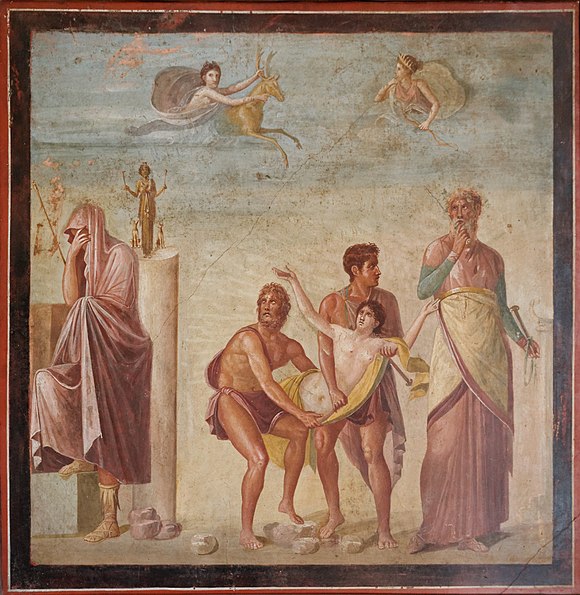 Sacrifice of Ifigenia, daughter of Agamemnon. The Roman poet Lucretius, who was a staunch follower of Epicurus, called this myth an example of the evil caused by popular religion
Sacrifice of Ifigenia, daughter of Agamemnon. The Roman poet Lucretius, who was a staunch follower of Epicurus, called this myth an example of the evil caused by popular religion
During his lifetime (according to the story) Epicurus wrote about three hundred books but to date not one has been saved. Only a few letters to his friends and several fragments which are entitled On Nature. The resource person for Epicurus' life and teachings was book X, Lives of Eminent Philosophers, by Diogenes Laertius. While Epicurus' teachings could be passed down properly by his students; Titus Lucretius Carus (99-55 BC) a Latin poet who composed Epicurus's thoughts in the form of verses entitled On the Nature of Things.
Among the philosophers themselves (after Augustus' reign) there was an agreement to reject the philosophy of Epicurus in order to accept the teachings of the Stoics. The emergence of the Christianity century, the materialistic teachings of Epicurus, and the rejection of divine provision were considered apostates, misleading, and even accused of atheism.
Embedded Videos
PHILOSOPHY - Epicurus
Epicurus | The Philosophy of Pleasure
Epicurus and the Good Life
How Epicurus Keeps Calm
EPICUREANISM: Ancient Answers to Modern Questions
EPICURUS: Four Steps to a Good Life (Epicureanism)
A Guide to Happiness - Epicurus on Happiness
Epicurus Life and Philosophy
Epicurus - Letter to Menoeceus
Comments & Conclusions
Influencing the world of philosophy
The biography of Epicurus notes that his work was quite influential in the development of the world of philosophy. This is evidenced by the fact that the teachings of Epicurus continued to exist in the writings of his disciples after Epicurus died.
Simultaneous events, periods or persons of Epicurus
| Persons/Events/Periods | Subcategory | From | To | Reason of importance |
|---|

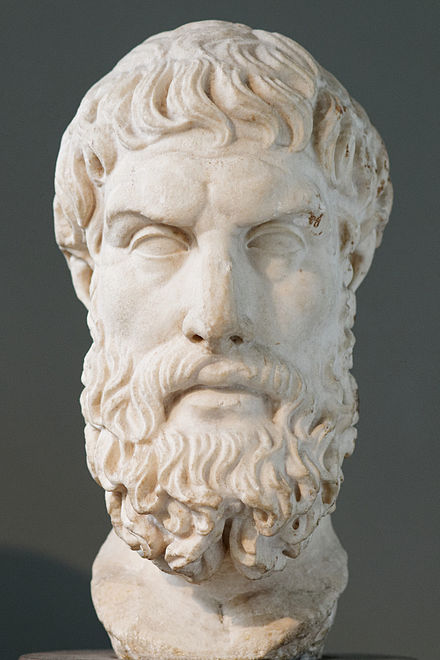

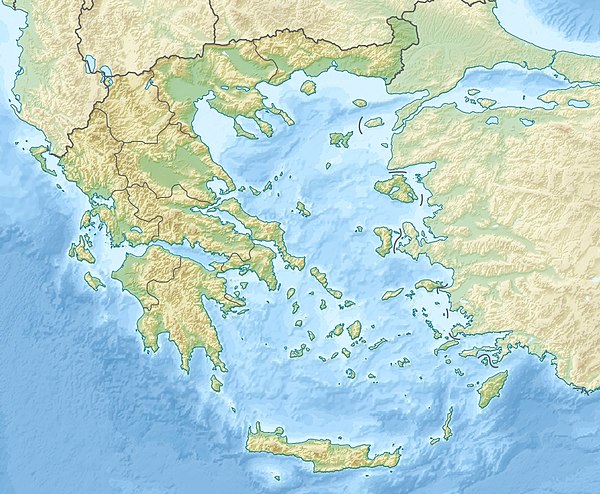
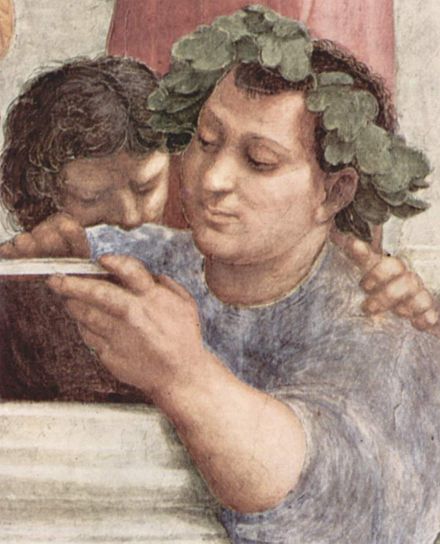
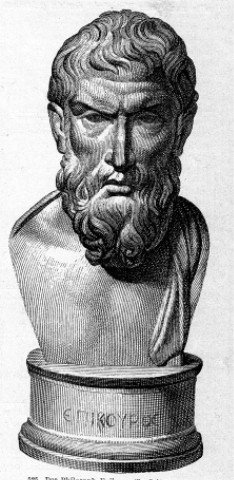

Comments
Links